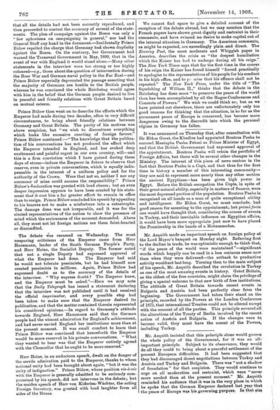Mr. Asquith made an important speech on foreign policy at
the Lord Mayor's banqUet on Monday night. Referring first to the decline in trade, he was optimistic enough to think that, "if the peace of the world were maintained "—significant words which happily can be read in a less ominous sense now than when they were delivered—the setback to productive activity would not last long. Turning then to the main subject of his speech, Mr. Asquith described the revolution in Turkey as one of the most amazing events in history. Great Britain, as the oldest of the free countries, might claim the privilege of giving a special welcome to that new birth of free institutions: The attitude of Great Britain towards recent events in Bulgaria and Austria had been perfectly clear from the beginning. The Government had taken their stand on the principle, recorded by the Powers at the London Conference of 1871, that international Treaties could not be altered except with the consent of all the parties. This principle covered all the alterations of the Treaty of Berlin involved by the recent action of Austria and Bulgaria. If the changes were to become valid, they must have the assent of the Powers; including Turkey.










































 Previous page
Previous page